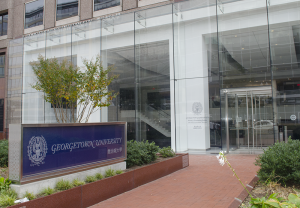
The School of Continuing Studies’ Institute for Transformational Leadership launches a certificate in facilitation next semester.
Georgetown’s Institute for Transformational Leadership at the School of Continuing Studies will debut the certificate in facilitation — a three-month workshop that teaches the skills needed to oversee workplace meetings — next semester as the first certificate in higher education of its kind.
According to Program Coordinator Kathryn Wade, SCS administrators developed the program because they believe facilitation skills are crucial to success in the workplace.
“There’s been a lot of anticipation around the program,” Wade said. “I think it’s one of those activities in the workplace and in the business world that when people are able to do it well, it can really result in some positive change within an organization.”
Associate Dean of the SCS Edwin Schmierer stressed the importance of facilitation skills and echoed Ringel’s optimistic sentiments about the program.
“As research shows, the best work is accomplished in teams, which means those with facilitation expertise and skills are highly valued. Moreover, facilitation is now a must-have skill for leaders, consultants and leadership coaches,” Schmierer wrote in an email to The Hoya. “We hope the Certificate in Facilitation program demonstrates how SCS continues to lead in offering experiential, practice-based and relevant leadership programs through the Institute for Transformational Leadership.”
Program applicants are required to have a bachelor’s degree and at least two to four years of experience leading teams. The application deadline is Dec. 1, and students will be notified of admissions decisions about one month later. Each class consists of 18 to 24 students, with meetings on Monday, Tuesday and Wednesday one week per month from 9 a.m. to 5 p.m.
The program consists of three modules: Being a Facilitator, The Art of Facilitation: Design and Craft, and Capstone: Facilitating Teams and Groups, that will be completed over a three-month period. The Certificate will include two stages — the technical and the transformational — where participants will learn about both concrete skills and their presence as facilitators.
Students will engage in collaborative and interactive work, including practice in conducting their own meetings, in addition to written assignments outside of the classroom. The program concludes with individual presentations on facilitation projects.
Program Director Rae Ringel highlighted the characteristics of a good facilitator the program will aim to develop in its students.
“There’s an actual craft to how you create and lead experiences of people being together. It’s all the preparation that you do before the experience, to find out what people need and want, and then it’s the facilitator — how they show up in that room and actually manage that room,” Ringel said. “I find that there’s not enough people who are doing this well, and people are increasingly resenting the fact that they have to go to so many of these experiences, and they’re not seeing the return on investment.”
Wade added that Ringel consistently emphasizes the need for good facilitators in the workplace.
“One of the things Rae talks to me about a lot is when someone is great at facilitation, they can bring people together to decide on a collective way forward that’s very positive and beneficial for an organization,” Wade said.
Ringel said the program will help students learn how to deal with current problems in the workplace, like the distraction of technology.
“The challenge we face now with technology is people spend so much time on their devices and social media and on computers,” Ringel said. “When people put down their devices and come together to work, it needs to be awesome.”
Ringel said she is optimistic about what participants will receive from the program.
“My hope is that people go back to their organizations, their schools, their enterprises, with not only a different perspective on how to gather people, but also with really critical skills and tools to be able to engage people in their work,” Ringel said. “[The program is] giving people a tool that they can really use in most places in their life.”




















